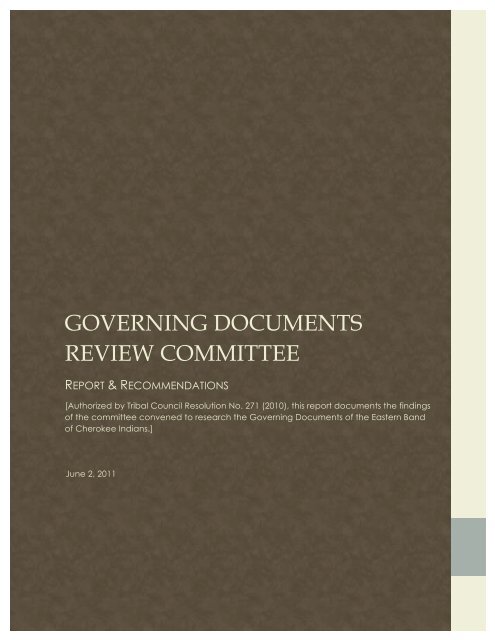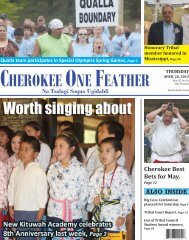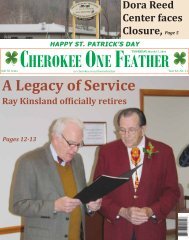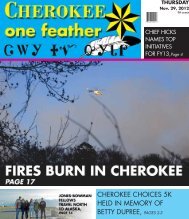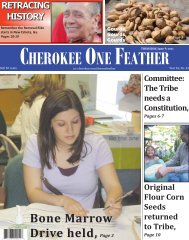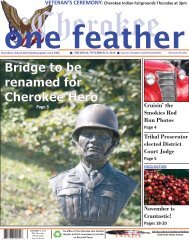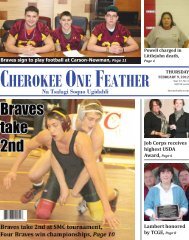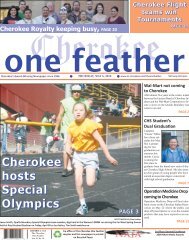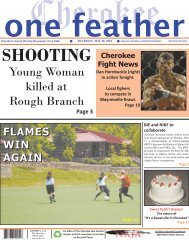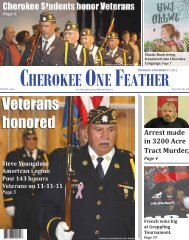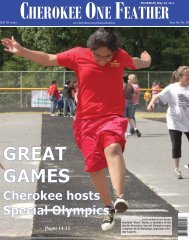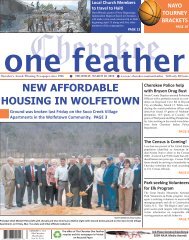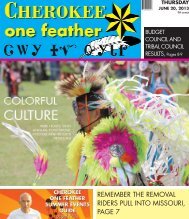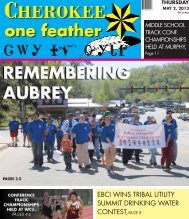Governing Documents Review Committee Report 6-2-11
Governing Documents Review Committee Report 6-2-11
Governing Documents Review Committee Report 6-2-11
- No tags were found...
Create successful ePaper yourself
Turn your PDF publications into a flip-book with our unique Google optimized e-Paper software.
GOVERNING DOCUMENTSREVIEW COMMITTEEREPORT & RECOMMENDATIONS[Authorized by Tribal Council Resolution No. 271 (2010), this report documents the findingsof the committee convened to research the <strong>Governing</strong> <strong>Documents</strong> of the Eastern Bandof Cherokee Indians.]June 2, 20<strong>11</strong>
Table of ContentsPROJECT OVERVIEW 3COMMITTEE MEMBERS & PROJECT CONTRIBUTORS 4HISTORY AND MATERIALS PRESENTED 6PROJECT OUTCOMES 8STATEMENTS OF FINDING 10RECOMMENDATIONS TO TRIBAL COUNCIL 12ATTACHMENT A 14DOCUMENTS IDENTIFIED AND COMPILED IN COURSE OF THE PROJECT 14MATERIALS COLLECTED AND PRESENTED TO QUALLA PUBLIC LIBRARY 15DECEMBER 2010 - MAY 20<strong>11</strong> 15ATTACHMENT B 21GOVERNING DOCUMENTS REVIEW COMMITTEE SESSIONS POWERPOINTPRESENTATIONS, FEBRUARY – APRIL 20<strong>11</strong> 21GOVERNING DOCUMENTS REVIEW COMMITTEE SESSIONS 22FEBRUARY 17, 20<strong>11</strong> SESSION 22MARCH 3, 20<strong>11</strong> SESSION 25MARCH 17, 20<strong>11</strong> SESSION 29APRIL 14, 20<strong>11</strong> SESSION 32APRIL 21, 20<strong>11</strong> SESSION 36<strong>Governing</strong> <strong>Documents</strong> <strong>Review</strong> <strong>Committee</strong>ATTACHMENT C 39TIMELINE OF EBCI GOVERNANCE PREPARED BY MS. PEGGY HILL, YELLOWHILLCOMMUNITY, MAY 20<strong>11</strong> 39TIME LINE OF EBCI GOVERNANCE 40ATTACHMENT D 42TRANSCRIPTIONS OF HISTORIC DOCUMENTS OF THE EASTERN BAND OFCHEROKEE INDIANS 1868 - 1875 421
DOCUMENT 1 43OFFICE OF INDIAN AFFAIRS COVER SHEET, OCT. 17, 1883 43DOCUMENT 2 44COVER LETTER SAM B. GIBSON, AGENT N. C. CHEROKEES, OCT. 10, 1883 44DOCUMENT 3 45DOCUMENT OF DECEMBER 10, 1868 (ADOPTED AT CHEOAH) 45DOCUMENT 4 47DOCUMENT OF NOVEMBER 26, 1870 (ADOPTED AT QUALLA TOWN, JACKSONCOUNTY, N.C.) 47DECEMBER 1 ST , 1870 49DOCUMENT 5 51DOCUMENT OF OCTOBER 13, 1875 (ADOPTED AT CHEOAH COUNCIL GROUND)51<strong>Governing</strong> <strong>Documents</strong> <strong>Review</strong> <strong>Committee</strong>ATTACHMENT E 56DOCUMENTS SHOWING PARALLEL PROVISIONS OF EASTERN BAND - AND STATE– ISSUED LAW 56LOYD WELCH CONSTITUTION (1875) & CHAPTER 207, 57NORTH CAROLINA PRIVATE LAWS (1897) 572
<strong>Governing</strong><strong>Documents</strong><strong>Review</strong><strong>Committee</strong><strong>Report</strong> & RecommendationsProject OverviewA long-standing controversy has troubled theEastern Band of Cherokee Indians community foralmost twenty-five years regarding the validity ofthe Tribe’s Charter and <strong>Governing</strong> document (the“Charter”). Although addressed by a 1993 TribalCouncil-authorized investigation by a committeemade up of Tribal Council and communitymembers, criticism of the Charter as invalidcontinues to persistently arise in Tribal Councilproceedings.Tribal Council authorized the examination of the<strong>Governing</strong> <strong>Documents</strong> in Resolution No. 271(2010) through the <strong>Committee</strong> convened “toresearch the governing documents of the Tribe,to clarify the role and function of the branches ofour tribal government, and to make suchrecommendations to Tribal Council that will effectthe goals of the findings.” The present projectundertook to examine the texts and origins of thetribe’s governing documents, their history, andthe development and approval of the 1986Charter. The <strong>Committee</strong> was charged to presentan informed report to Tribal Council as to anydefects in the Tribe’s current organizationalintegrity.“. . . I havestudied and laboredfor the past ten yearsof my life, to secureto my brothers equalJustice from theirbrothers of the westand the UnitedStates, and that youwould no longer behewers of wood anddrawers of water, butassume that proudposition among thecivilized nations ofthe earth intended bythe Creator that weshould occupy, andwhich in the futureyou will take or beexterminated.”Farewell Address,1880, LloydWelch, PrincipalChief, EasternBand CherokeeIndians<strong>Governing</strong> <strong>Documents</strong> <strong>Review</strong> <strong>Committee</strong>3
The <strong>Committee</strong> was also authorized to seeking funding to support the activities incarrying out the intent of the Resolution. The Cherokee Preservation Foundationawarded the <strong>Committee</strong> discretionary funding to implement this work. Mr.Robert Connelly, Sequoyah Distinguished Professor of Western Carolina University,also contributed funds to the project. The Qualla Library facilitated this project asthe fiscal agent for the grants and hosted the 10-week series of research, analysisand discussion.The research sessions were facilitated by Ms. Sarah Sneed, J.D., who is uniquelyqualified due to her extensive experience in working with Indian tribes and theEastern Band community. Ms. Sneed is an enrolled member of the EBCI andgraduate of Harvard Law School. Ms. Carolyn West, J.D., graduate of Universityof New Mexico Law School and recently admitted member of the NC Bar, alsoan enrolled member, served as assistant facilitator.<strong>Governing</strong> <strong>Documents</strong> <strong>Review</strong> <strong>Committee</strong>The project proposed that <strong>Committee</strong> members would develop Statements ofFindings regarding the historic development of the current Tribal government andadvise the Tribal Council of these conclusions at project’s end. The project wasdesigned so that members of the <strong>Committee</strong> who did not concur with theconclusions reached by the majority of <strong>Committee</strong> members could state theirdissenting opinions and present these separate findings to the Tribal Council.<strong>Committee</strong> Members & Project ContributorsEach of the Eastern Band Community Clubs was asked to select a communitymember to serve on the <strong>Committee</strong>. Nine <strong>Committee</strong> members were appointedto the <strong>Committee</strong> December 21, 2010. The <strong>Committee</strong> members are:Mr. Lloyd Arneach, Yellowhill CommunityMr. Frankie Bottchenbaugh, Big Cove CommunityMs. Kathy “Rock” Burgess, Wolfetown CommunityMs. Lois Dunston, Painttown CommunityMs. Lynne Harlan, Big Y CommunityMr. Roger Smoker, Snowbird CommunityMs. Jody Taylor, Birdtown CommunityMs. Barbara Vicknair, Cherokee CountyMr. Arthur Wade, 3200 Acre TractThe <strong>Committee</strong>’s working sessions were open to the public and the projectgreatly benefitted from the work and contributions made by individuals whojoined the endeavor:4Ms. Dawn Arneach, Yellowhill CommunityMr. Tommy Chekelelee, Snowbird CommunityMs. Terri Henry, Painttown CommunityMs. Peggy Hill, Yellowhill Community
Mr. George Martin, Birdtown CommunityMs. Louise Reed, Snowbird CommunityMr. Matthew Tooni, Painttown CommunityMs. Mary Wachacha, Yellowhill CommunityMs. Amy Walker, 3200 Acre TractAt its first meeting, <strong>Committee</strong> members devised a workable schedule for the tenweekly sessions. The sessions were conducted Thursday evenings from 5 p.m. to 7p.m. Eight of the sessions were conducted at the Qualla Public Library. The ninthsession, held on April 7, 20<strong>11</strong>, was conducted at the Senior Citizens’ Center inSnowbird and the final session, held April 21 at the Senior Citizen’s Center inCherokee Countys ensured inclusion of those communities in the project’sactivities.Each of ten (10) project sessions was videotaped by Jeremy Brown andNathaniel Wade of the EBCI Information Technology (IT) department, andbroadcast, with at least one repeatairing per week, over the tribal televisionchannel, Channel 28. The entire serieswas played back-to-back, on April 23,20<strong>11</strong>.The EBCI Tribal Operations Program(TOP), Office of the Attorney Generaland individual members of the EasternBand Community contributed materialsfor <strong>Committee</strong> research and review.Over fifty(50) documents were collectedthrough the course of the project andwill be made available to the publicthrough the Qualla Public Library,Snowbird Library and Murphy PublicLibrary.Key documents will be presented toCherokee Central Schools, Swain andJackson County Schools, WesternCarolina University’s Cherokee Centerand Hunter Library and the Museum ofthe Cherokee Indian.The <strong>Committee</strong> would like to take thisopportunity to extend their gratitude to thefollowing:To Tribal Council for trusting its citizens toexamine the governing documents and theirhistory by authorizing this important work.To the Community Clubs for theirrecommendations of community members tothe <strong>Committee</strong>.To Cherokee Preservation Foundation, WCUProfessor Robert Conely and the QuallaLibrary for their gracious contributions.To the Community Member Contributors fortheir encouragement, support and interest inthis work.To Jeremy Brown, Nathaniel Wade and the ITDepartment, and, Bruce Welch and theTransit Program for their technical support ofthe groups work.To Sarah Sneed for guiding the committee inits research, analysis and process, and toCarolyn West’s assistance in the research ofthe project. This report to Council, includingthe compilation of certain documentsexamined, i.e., the documents received fromthe NC State Legislative Library, wasdeveloped in collaboration with the<strong>Committee</strong> and written by Sarah Sneed.<strong>Governing</strong> <strong>Documents</strong> <strong>Review</strong> <strong>Committee</strong>5And finally, to the viewing public for theirinterest in and feedback to the <strong>Committee</strong>.
History and Materials Presented<strong>Committee</strong> working sessions were planned with two objectives in mind: tointroduce concepts of constitutionalism and to understand the development ofEastern Band self-governance from pre-colonial times to the present-day.The sessions began with a discussion of the pre-contact (traditional) legal systemof the Cherokee, which, through its clan system, entailed a fully constitutionallegal system. See Reid, A Law of Blood: The Primitive Law of the CherokeeNations and Strickland, Fire and the Spirit: Cherokee Law from Clan to Court.<strong>Governing</strong> <strong>Documents</strong> <strong>Review</strong> <strong>Committee</strong>Through this presentation, basic concepts of constitutionalism were introduced,as well as a description of the conflict that arose between original Cherokee selfgovernanceand the Europeans’ push to have the Cherokees adopt arepresentational government, the mechanism through which Europeans couldmore readily gain title to lands of indigenous Americans, including those of theCherokee.The geographical categorization of the Cherokee villages was discussed, i.e.,Upper, Middle, Outer, Lower Towns, explaining how, though not organized undera single leader and absent a national center, the law of clanship unified theCherokees as a people and a nation. But the 50-60 Cherokee towns, eachunder autonomous leadership that included spiritual councils and politicalcouncils, as well as war and peace councils, did not fit the European powers’need for the identification of a single “chief” who could bind the whole of theCherokee nation to land cessions.The Cherokees faced other legal constructs as the British sovereign claimed theirlands. The Charter under which King George authorized the founding of thecolony of Georgia, part of the Cherokee homeland, was discussed to introduceconcepts of international law, later inherited by the United States, and tointroduce concepts of federal Indian policy.Prior to the present project, the Eastern Band has not recognized its origins as firstappearing in the Treaty of Cherokee Agency (1817) and the Treaty ofWashington (1819). The Treaty of Cherokee Agency references a meeting in 1808between Cherokee delegates and President Thomas Jefferson, at which UpperTown Cherokees expressed a desire to secede from the Cherokee Nation inpursuit of civilization and citizenship.Under the terms of these treaties, the United States granted a number ofCherokee households, properly registered with the federal Indian Agent,individual reservations of 640 acres in western North Carolina, in exchange forpledges that they would become citizens of the United States.6The provisions of these treaties were frustrated, however, by conflicting legaldoctrine, such as principles of federalism, and the realities of a racist politicalorder that denied citizenship to Native- and African-Americans. North Carolina
Cherokees were denied citizenship by the state and would not be grantedUnited States citizenship until 1924. Thus, the treaties of 1817 and 1819 failed tofulfill the promises made to the Cherokee men registered thereunder, althoughthe land concessions promised to the United States were, of course, fullyexecuted.The North Carolina Supreme Court ruled in 1824 that the individual parties to thetreaties took the lands in full legal title, Euchela v. Welsh, 3 Hawks 135, whichmeant as well that the individual Cherokee reservations could be purchased orswindled away from the Cherokee families. The Upper Cherokees who agreed tothe terms of the 1817 and 1819 treaties were ultimately left without a legalidentity and lost their individual reservations. This political and legal vulnerabilitywould drive the development of Eastern Band government through the twentiethcentury.North Carolina Cherokees endured this all-pervasive uncertainty through theRemoval of their Cherokee Nation relations and the Civil War until, in 1868, theyconvened, in a Grand Council at Cheoah near what is now the Snowbirdcommunity, to prepare an organizing document. This first expression of EasternCherokee self-governance is the earliest of three documents contained in what isreferred to as the “Loyd Welch Constitution.” The 1868 Cheoah document wasexpanded and revised through amendment in 1870 by the people assembled atQualla Town, near present-day Cherokee, North Carolina. Loyd Welch wasPrincipal Chief when the governing document was finally rewritten and adoptedin 1875 at the Cheoah Council Grounds.The remarkable accomplishment of developing and instituting a constitutionalgovernment was betrayed, however, when in 1886, the United States SupremeCourt ruled against the Eastern Cherokees in The Cherokee Trust Funds, theEastern Band of Cherokee Indians v. the United States and Cherokee Nation,commonly called the Cherokee Nation West, <strong>11</strong>7 U.S. 288. In its decision, theCourt commented on the Eastern Band’s constitutional documents, refuting itsauthority to organize under a constitutional system. The Court stated that theEastern Cherokees had given up their status as an Indian tribe when theyseparated from the Cherokee Nation under the 1817 and 1819 treaties, and in sodoing became subject to the laws of North Carolina, foreclosing the possibility oforganization under a separate constitution.<strong>Governing</strong> <strong>Documents</strong> <strong>Review</strong> <strong>Committee</strong>Unable to hold property and without legal protection, the Eastern Band thenturned to the state legislature obtaining a corporate charter from the NorthCarolina in 1889, Chapter 2<strong>11</strong>, North Carolina Private Session Laws, amended in1897 as Chapter 207. Once it achieved status as a North Carolina corporation,the Eastern Cherokees could finally own land and took title to the QuallaBoundary in 1897.From this date, the state-issued charter was amended several times in the years1931 to 1947 and served as the Eastern Band’s governing document until 1986,7
when it was modified and issued as its Charter and Government Documentpursuant to its inherent tribal sovereignty.The 1986 amendments have been repeatedly challenged by tribal members forfailing to have been legally ratified. In 1993, the Eastern Band Tribal Councilapproved the creation of an investigating committee to look into anydeficiencies in the referendum election through which the Charter and<strong>Governing</strong> Document was approved. The <strong>Committee</strong> authorized underResolution No. 1 of that year concluded that Chapter 207 was in effect at thetime of the 1986 referendum and its provisions were not followed, thereforeinvalidating approval of the Charter and <strong>Governing</strong> Document.<strong>Governing</strong> <strong>Documents</strong> <strong>Review</strong> <strong>Committee</strong>The present <strong>Committee</strong>’s review of the Eastern Band’s historic materials led to adifferent conclusion, which in its Statements of Finding and Recommendationsfollow below.Project Outcomes<strong>Committee</strong> members, together with the Project Facilitator, made a preliminaryreport to the Tribal Council at its May 5, 20<strong>11</strong>, regular Council session. The<strong>Committee</strong> requested a working session with the Council and to be placed onthe agenda for a full report of its Statements of Finding and Recommendations atthe June 2, 20<strong>11</strong>, regular Council session.Over fifty (50) documents were compiled and organized for inclusion in thecourse of the Project (See Attachment A, “<strong>Documents</strong> identified and compiled incourse of <strong>Governing</strong> Document <strong>Review</strong> <strong>Committee</strong> Project.”) These materials,along with a notebook of materials compiled through the course of the project,and DVD recordings of the <strong>Committee</strong> working sessions will be available at theQualla Public Library, the Snowbird library and the Murphy Public Library.In response to Council interest in ensuring these materials are available to theprimary and secondary schools that serve the EBCI, a set of <strong>Committee</strong> materialswill also be presented to the Cherokee Central School System and Swain,Jackson and Graham County School Districts, for access by Eastern Bandstudents. Similarly, the materials will be provided to Western Carolina University’sCherokee Center and Hunter Library.Digitized copies of North Carolina statutory provisions provided by the NorthCarolina Legislative Library comprising the state-issued Charter (1887-1986) havebeen distributed to the Qualla Public Library, the EBCI Tribal Operations (TOP)office and the EBCI Office of the Attorney General.8In studying the Loyd Welch Constitution, the <strong>Committee</strong> was able to evaluate theauthenticity of several versions of the document in current circulation anddetermine the best version available for research purposes.
Each <strong>Committee</strong> member was provided a copy of John R. Finger’s books, TheEastern Band of Cherokee Indians 1819-1900 (1984) and The Eastern Band ofCherokees in the Twentieth Century (1993) to provide background informationabout the development of the tribal government.A number of interested community members joined this <strong>Committee</strong>’s effort,actively participating in session discussions and contributing historic documentsfrom their personal collections.Throughout the course of the project, participants received numerous informalstatements of interest and appreciation from tribal members who watched thesession broadcasts on cablevision’s Channel 28.The development of Statements of Finding and Recommendations requiredintensive small-group discussion following the tenth and final working session inCherokee County. To date, two meetings have been held to work on these finalwork products. Additional sessions were held in order to finalize the Findings andRecommendations for presentation to the Tribal Council on June 2, 20<strong>11</strong>.Respectfully submitted,The <strong>Governing</strong> <strong>Documents</strong> <strong>Review</strong> <strong>Committee</strong>June 2, 20<strong>11</strong><strong>Governing</strong> <strong>Documents</strong> <strong>Review</strong> <strong>Committee</strong>9
Statements of Finding and RecommendationsThe Statements of Finding and Recommendations that follow• Seek to clarify the authenticity of the Eastern Band’s historic documents;• Document the succession of documents under which the Eastern Bandhas been organized, from the Loyd Welch Constitution of 1875 throughthe adoption of the current Charter and <strong>Governing</strong> Document under theEBCI’S inherent tribal sovereignty in 1986;• Identify any deficiencies in the 1986 adoption of the Charter and<strong>Governing</strong> Document; and<strong>Governing</strong> <strong>Documents</strong> <strong>Review</strong> <strong>Committee</strong>• Advocate for continued public education regarding the evolution of theEastern Band from the original families who broke away from the greaterCherokee Nation under Treaties with the United States in 1817 and 1819, inorder that ongoing disputes regarding the legitimacy of the tribe’sorganic legal structure can be finally resolved.The findings and recommendations are submitted in the spirit with which the<strong>Committee</strong>’s working sessions were conducted, with utmost respect for ourforebearers, whose intelligence and determination that the Cherokees of NorthCarolina should remain together as a separate, and eventually, federallyrecognizedtribe, are fully evident in the history of the Eastern Band of CherokeeIndians.Statements of FindingThese Statements of Finding are derived from the discussions of the <strong>Governing</strong>Document <strong>Review</strong> <strong>Committee</strong> of the documents reviews, the committee’sunderstanding of the times in which they were developed, and sense of theTribe’s history.Statement of Finding No. 1: The Loyd Welch ConstitutionThe Loyd Welch Constitution is comprised of three separate documents. The firstwas adopted at Cheoah in 1868. This rudimentary organizing document wasamended at Qualla Town in 1870. The Qualla Town document was revised andgreatly expanded through the adoption of an 1875 constitution at CheoahCouncil Grounds in 1875.10The <strong>Committee</strong> based its work on the handwritten copy of the Loyd WelchConstitution certified on October 6, 1883, in Swain County Superior Court by W.R.Grant, Clerk of Court.
Statement of Finding No. 2: Eastern Band of Cherokee Indians Charter &<strong>Governing</strong> DocumentThe Loyd Welch Constitution was rejected as a legal constitution by the U.S.Supreme Court in The Cherokee Trust Fund; Eastern Band of Cherokee Indians v.United States and Cherokee Nation, <strong>11</strong>7 U.S. 288 (1886), in which the Court statedthat the Eastern Band of Cherokee Indians were not an organized body, hadentered into no treaties with the federal government, and its members werecitizens of the state of North Carolina.As a result of this decision, Eastern Band leaders were prompted to pursuerecognition by North Carolina through a state-issued business charter, which waslegislated into law in 1889.In 1897, this corporate document was amended, as Chapter 207 of the NorthCarolina Private Session laws, to include articles from the 1875 Loyd WelchConstitution. Although by law the intentions of the Eastern Band werediscounted by the United States, Eastern Band members viewed the charter astheir “Constitution & Charter,” believing that the spirit of the Loyd WelchConstitution was embodied in the provisions of Chapter 207, North CarolinaPrivate Session Laws.Chapter 207 was upheld as the governing document of the Eastern Band in 1931and on February 19, 1934, over the signatures of nine Council members, the TribalCouncil Chairman, the Principal Chief and Agency Superintendent submitted theprovision f Chapter 207 as the Tribe’s constitution in response to federal inquiry asto whether the Eastern Band wished to accept the provisions of the IndianReorganization Act.In 1947, the North Carolina legislature amended Chapter 207 to give authority forfull self-government to the Eastern Band.In 1986, the Charter was amended and issued under the Eastern Band’s inherenttribal sovereignty as the Charter and <strong>Governing</strong> Document of the Eastern Bandof Cherokee Indians.<strong>Governing</strong> <strong>Documents</strong> <strong>Review</strong> <strong>Committee</strong>Statement of Finding No. 3: Resolution No. 1 (1993) <strong>Committee</strong> Conclusions onGrand Council & 25% Voter Approval RequirementIn 1993, an Investigating <strong>Committee</strong> concluded that the 1986 adoption andratification of the current Charter and <strong>Governing</strong> Document was invalid becausethe approval requirement in place under Chapter 207 had not been fulfilled.See, Transcript Eastern Band of Cherokee Indians Special Council Proceedings,December 13, 1993, pp. 9-19.The <strong>Committee</strong> finds that there is insufficient information in the Loyd Welchconstitutional documents and Chapter 207 to form a conclusion regarding therole and function of the Grand Council. The <strong>Committee</strong> does not agree that thereferendum to approve the 1986 Charter and <strong>Governing</strong> Document was invalid<strong>11</strong>
ecause a Grand Council was not called and a two year period of deliberationwas not provided.The <strong>Committee</strong> does conclude, however, that the number of registered votescast to approve the 1986 changes to the EBCI governing document did notmeet the 25% approval requirement set by Tribal Council for that election. See,Transcript Eastern Band of Cherokee Indians Special Council Proceedings,December 13, 1993, Minutes of May 8, 1986, following p. 13, and letters fromSuperintendent Wilbur Paul to Principal Chief Robert Youngdeer, October 9, 1986,November 4, 1986, and December <strong>11</strong>, 1986, reporting results of the October 8,1986, Referendum.Statement of Finding No. 4: Enhancement & Expansion of the EBCI Charter &<strong>Governing</strong> Document<strong>Governing</strong> <strong>Documents</strong> <strong>Review</strong> <strong>Committee</strong>The Charter and <strong>Governing</strong> Document needs to be expanded and enhancedunder constitutional principles, which must include an independent court systemand protection of the civil rights of tribal members.Statement of Finding No. 5: Develop Educational Training & Materials on the EBCICharter & <strong>Governing</strong> DocumentEducation regarding the current Charter and <strong>Governing</strong> Document, the LoydWelch Constitution and Chapter 207, should be encouraged and promoted,including a focused inquiry consulting with Cherokee-speakers and tribal eldersinto our political history, in order to understand how the Cherokee languageprovides insight into the structure of EBCI government in the 19 th and early 20 thcentury.Recommendations to Tribal CouncilHaving concluded its study of the historic documents of the Eastern Band ofCherokee Indians, the <strong>Governing</strong> Document <strong>Review</strong> <strong>Committee</strong> recommends:1. That the historic documents of the EBCI assembled and compiled in thecourse of the <strong>Governing</strong> Document <strong>Review</strong> <strong>Committee</strong> project bepreserved, organized and maintained for accessibility by the EBCI tribalmembership.122. That the Tribal Council support the development of public education,presented in the Cherokee language as well as in English, regarding theevolution of the Eastern Band in the hundred years between the adoptionof the Loyd Welch Constitution to the 1986 amended Charter and<strong>Governing</strong> Document. This history is of monumental cultural value to thepeople of the Eastern Band and could inform tribal members regardingissues, past and current, in tribal governance.
3. That the EBCI government should be restructured pursuant to aconstitutional system that includes independent branches of government,separation of powers and protection of individual members’ rights.4. That Tribal Council make budgetary accommodations, whether throughgrant or tribal funds, to develop a governing document consistent withconstitutional standards as the <strong>Committee</strong> finds to be necessary.5. That the Tribal Council adopt an approval percentage requirement fortribal referenda that is based on the number of members voting, ratherthan on the total number of registered voters to avoid the problem thatarose with respect to the 1986 referendum. . See, Transcript Eastern Bandof Cherokee Indians Special Council Proceedings, December 13, 1993,Minutes of May 8, 1986, following p. 13, and Letters from SuperintendentWilbur Paul to Principal Chief Robert Youngdeer, October 9, 1986,November 4, 1986, and December <strong>11</strong>, 1986, reporting results of theOctober 8, 1986, Referendum.<strong>Governing</strong> <strong>Documents</strong> <strong>Review</strong> <strong>Committee</strong>13
ATTACHMENT ADOCUMENTS IDENTIFIED AND COMPILED IN COURSE OF THEPROJECT<strong>Governing</strong> <strong>Documents</strong> <strong>Review</strong> <strong>Committee</strong>14
Materials Collected and Presented to Qualla Public LibraryDecember 2010 - May 20<strong>11</strong>1. 1817, Jul 8 Treaty of Cherokee Agency, 7 Stat. 1562. 1819, Feb 27 Treaty of Washington, 7 Stat. 1953. 1824, Jun Doe on demise of Eu-che-lah v. Welsh, 2 Hawks 155, Supreme Court ofNorth Carolina4. 1870-1875 Unattributed printed copy of Lloyd 1 Welch Constitution, markedAppendix “A,” text is incomplete5. 1875 Typewritten version of Loyd Welch Constitution, abstracted version,unauthenticated6. 1882, Feb 25 U.S. House of Representatives, 47 th Congress: Eastern Cherokees in NorthCarolina, letter from the Secretary of the Interior. (Pages 6-12 aremissing)7. 1883, Oct 10 Handwritten, certified version of Loyd Welch Constitution transmitted toOffice of Indian Affairs (includes 1868, 1870 and 1875 organizingdocuments of the North Carolina Cherokees)<strong>Governing</strong> <strong>Documents</strong> <strong>Review</strong> <strong>Committee</strong>8. 1883, Oct 10 Typewritten version of Loyd Welch Constitution, including cover letterfrom Sam B. Gibson, Agent, N.C. Cherokees to Hon. H. Price9. 1886, Mar 1 The Cherokee Trust Funds; Eastern Band of Cherokee Indians v. UnitedStates and Cherokee Nation, commonly called Cherokee Nation West,<strong>11</strong>7 U.S. 2881 The best representation of the Loyd Welch Constitution, the 1883 handwritten documentcertified by the Swain County Superior Clerk of Court (document 7.), transcribes Principle ChiefWelch’s first name as “Loyd.” Subsequent typewritten documents spell the name “Lloyd.” The<strong>Committee</strong> adhered to the spelling contained in the 1883 certified document.15
10. 1897, Mar 8 Private Laws of North Carolina, Chapter 207 (amended state charter ofthe Eastern Band of Cherokee Indians<strong>11</strong>. 1897, Mar 8 Typewritten version of Private Laws of North Carolina, Chapter 20712. 1889 Private Laws of North Carolina, Chapter 2<strong>11</strong> (original state charter ofEastern Band of Cherokee Indians)<strong>Governing</strong> <strong>Documents</strong> <strong>Review</strong> <strong>Committee</strong>13. 1892 Extra Census Bulletin, Eastern Band of Cherokees of North Carolina byThomas Donaldson (contains text of Loyd Welch constitutionaldocuments deviating from original)14. 1895 Private Laws of North Carolina, Chapter 166 (amended state charter ofEastern Band of Cherokee Indians)15. 1897, Mar 8 Private Laws of North Carolina, Chapter 207 (amended state charter ofEastern Band of Cherokee Indians)16. 1897, Mar 8 Unatttributed typewritten version of Private Laws of North Carolina,Chapter 207 (includes copy of EBCI adoption of provisions of Chapter207)17. 1930, Feb 24 Reply Brief, In the Matter of the Enrollment of the Members of the EasternBand of Cherokees of North Carolina, Joseph W. Howell, Attorney for theEBCI18. 1931 Private Laws of North Carolina, Chapter 128 (amendments to statecharter of Eastern Band of Cherokee Indians)19. 1933 Private Laws of North Carolina, Chapter 39 (amendment to state charterof Eastern Band of Cherokee Indians)1620. 1934, Feb 14 Letter re: EBCI response to Indian Reorganization Act
21. 1939, Feb 15 Resolution No. <strong>11</strong>5 EBCI response to Indian Reorganization Act22. 1947, Apr 5 Session Laws of North Carolina, Chapter 978 (amendment to statecharter of Eastern Band of Cherokee Indians)23. 1947, Aug 6 Letter from Henry Bradley, Candidate for Chief, and Mollie G. Arneach,Candidate for Council member, Cherokee Township, to N.C. AttorneyGeneral Harry McMullan re: Chapter 978, North Carolina Session Laws194724. 1958, Apr 14 Resolution No. 58-147 regarding proposed regulations governing revisionof EBCI membership roll25. 1965, Dec 13 Notice, from Frell M. Owl, Chairman Constitution <strong>Committee</strong>, to AllMembers of the Eastern Band of Cherokee Indians re: ProposedConstitution and Bylaws of the Eastern Band of Cherokee Indians(includes Tentative Draft of Proposed Constitution and Bylaws November18, 1965)26. 1976, Aug 5 Materials prepared for Cherokee Tribal Council by Holt, Haire & Bridgers,P.A., Tribal Attorneys, for proposed Constitution of the Eastern Band ofCherokee Indians27. 1978, May 2 & 23 Minutes of Constitution <strong>Committee</strong> May 2, and May 23,1978<strong>Governing</strong> <strong>Documents</strong> <strong>Review</strong> <strong>Committee</strong>28. 1978, Oct 23 Draft Cherokee Constitution (includes questionnaire regarding changesin tribal governing document and related issues)29 1979, Jan 30 Draft EBCI Constitution (unratified)30. 1980, Aug An Historical Analysis of the Legal Status of the North Carolina Cherokeesby Ben Oshel Bridgers, reprinted from the University of North CarolinaSchool of Law, N.C. Law <strong>Review</strong>17
31. 1983, Dec 7 “Proposed Constitution,” Cherokee One Feather, pp. 8-1432. 1984, Jan 6 Transcript, Annual Council proceedings regarding proposed EBCIconstitution and approval requirements33. 1986, May 8 Resolution No. 132, authorizing referendum to approve changes to theTribal Charter34. 1986, Oct 9 Transmittal letter from Superintendent Wilbur Paul to Principal ChiefRobert S. Youngdeer advising of outcome of October 8, 1986,referendum re: revised Tribal Charter<strong>Governing</strong> <strong>Documents</strong> <strong>Review</strong> <strong>Committee</strong>35. 1986, Nov 4 Transmittal letter from Superintendent Wilbur Paul to Principal ChiefRobert S. Youngdeer advising of outcome of October 8, 1986,referendum re: revised Tribal Charter, which Principal Chief Youngdeerhad vetoed36. 1986, Dec <strong>11</strong> Resolution No. 461 approving outcome of October 8, 1986, referendumand directing Attorney General to revise charter to reflect approvedchanges37. 1987, Apr 2 Transmittal letter from Superintendent Wilbur Paul to Principal ChiefRobert S. Youngdeer advising of outcome of October 8, 1986,referendum re: revised Tribal Charter and that the tribal Attorney hadbeen directed to revise the Charter38. 1993, Aug 2 Letter from Interior Department Bureau of Indian Affairs, Director OfficeTribal Services to Virginia Sexton (includes signed petition supportinginvestigation of the 1986 referendum amending EBCI governingdocument; copies of Lloyd Welch Constitution (abstracted version);Farewell Address of Lloyd Welch and materials related to Investigating<strong>Committee</strong> under Resolution No. 1, 19931839. 1993, Oct 1 Resolution No. 1 authorizing <strong>Committee</strong> to investigate validity of EBCICharter and <strong>Governing</strong> Document adopted 1986, includes transcript of<strong>Committee</strong> report to Tribal Council, December 13, 1993
40. 1993, Nov 23 Pamphlet, ”WAKE UP!” Includes letters from Richard Tesatuskee,Chairman, Yellow Hill Community Club to Inspector General of theInterior Department and Wilbur Paul, Superintendent regarding validity of1986 Charter and <strong>Governing</strong> Document and memorandum from BobWarren regarding powers of the Grand Council41. 1995, May 4 Resolution No. 479 ordering no action taken on Ordinance 434 until newCouncil is seated. (Includes reference to Tribal Council killing resolutionto act upon Recommendations of the Investigating <strong>Committee</strong> ofResolution No. 1, 1993)42. 1996, Jun 24 Ordinance No. 284, Enrollment Ordinance reflecting amendments43. 1996, Aug 14 Resolution No. 310, authorizing Principal Chief Joyce C. Dugan tocontract with Robert Lyttle and Richard Monette to develop an EBCIconstitution (includes transmittal letter from Wilbur Paul, Superintendent,to Principal Chief Dugan)44. 1997, Sept 25 Resolution No. 715 authorizing Secretary of the Interior to initiate electionprocess for Secretarial Election approval of proposed Constitution45. 1998, Jun 3 Advisory Opinion re: EBCI eligibility for state funds from Clean WaterManagement Trust Fund to David McNaught, Executive Director, CleanWater Management Trust Fund from Daniel C. Oakley, Senior DeputyAttorney General and Robin W. Smith, Assistant Attorney General<strong>Governing</strong> <strong>Documents</strong> <strong>Review</strong> <strong>Committee</strong>46. 1999, Oct 4 U.S. Dept. of the Interior certified version of proposed constitution forSecretarial Election (unratifed)47. 1999, Oct 4 Constitution of the Eastern Band of Cherokee of Qualla Boundary (1999-Final Draft)48. 2000, Oct 10 Resolution No. 471 (withdrawn) request from John Adam Squirrel, anenrolled EBCI member, requesting Tribal Council adopt the Lloyd WelchConstitution as a governing document of the EBCI19
49. 2006, Jan 5 Resolution No. 143 to establish a committee to create a new EBCICharter / Constitution (includes Resolution No. 36 (October 20,2005)authorizing the establishment of a committee to draft a newCharter/Constitution50. 2008, Aug 26 Letter from Bob Warren, P.A. to Ruth Youngbird Beck with enclosuresregarding documents and draft constitutions related to the EBCI.Enclosure noted, i.e., letter to Duane King, is missing51. 2008, Apr 3 Notebook, materials for EBCI tribal officials regarding “one-man, onevoterequirement resulting from Wachacha v. EBCI, Civil No. BC-C74-23,W.D.N.C. (1974), prepared by Ben Oshel Bridgers<strong>Governing</strong> <strong>Documents</strong> <strong>Review</strong> <strong>Committee</strong>52. 2008, Dec 4 Resolution No. 606 (tabled and withdrawn) regarding establishment of acommittee to draft an EBCI constitution (includes copy of Resolution No.391, January 19, 1995, withdrawn, regarding prior authorization for aconstitution committee; Resolution No. 318, October 12, 1994, calling forconvening of Grand Council on October 15, 1994; Resolution No. 310,July 24, 1996, authorizing Principal Chief Joyce C. Dugan to contractwith Robert Lyttle and Richard Monette to develop an EBCI constitution)53. Undated Unattributed essay re: Treaty of Hopewell, 178554. Undated Unattributed essay re: Treaty of New Echota, 183555. Undated Article by Brett Riggs, “John Welch and the Valley Towns Conspiracy”56. Undated List courtesy of Ray Kinsland, “Principal Chiefs since Reorganization”20
<strong>Governing</strong> <strong>Documents</strong> <strong>Review</strong> <strong>Committee</strong> SessionsOver the course of the sessions, PowerPoint presentations were developedand provided by Ms. Sarah Sneed, Project Facilitator. Not all sessions had suchpresentations; some sessions were facilitated discussions amongst the<strong>Committee</strong>. The pages following are the PowerPoint presentations as providedduring the course of the sessions.February 17, 20<strong>11</strong> Session!"#$"%%&<strong>Governing</strong> <strong>Documents</strong> <strong>Review</strong> <strong>Committee</strong>'()*+,&-+&.*+/-01&234&!"#$#%&&5,6&789*:4(+&;*&&?4@(A&;9-+0-:A4,&*B&.*+C84,1&&234&D-,0*549>&D*019-+4&– 234&E4*9@-(&.3(9149&F%G#HI&– J*3+,*+&56&KLM+1*,3&F%=H#I&– N*904,149&56&E4*9@-(&F%=#HI&&22%&
!"#$"%%&!"#$#%&&()*+&,*-&• ./+012+34&*5&*&02678393+5:;3&)336&• ./)?))5&43?+:12+&2@&*&02+51>/12+*)&5=5>36&• ()*+&*A):*12+&-*5&6*>8:):+3*)&• ,3=&*62+93&K*))3=&*+4&L:44)3&G2-+5&*+4&F/>&G2-+&;:))*93&,2-38&G2-+5&H:+&7E4E&M2/>9&(*82):+*&*+4&N328
K,;1&(LB,/;(;&.0&1(33*1.34&• F2(&M(+.K,7&(N()-K(74&(L-/6@*;2(=&92(3.:((&7,/=&-17(&*/&12(&;.@12(,;1(3/&OPH&&!"#$#%&'H@3K*K,7&• Q/&12(&%R 12 &)(/1@348&12(&92(3.:((&G,-./&(/6,6(=&*/&;@))(;;*K(&+*7*1,34&./;7,@621;&*/)7@=*/6&)./S*)1&A*12&).7./*,7&0.3)(;8&),+B,*6/;&
March 3, 20<strong>11</strong> Session!"#$"%%&'()*&+,-./012&304506&),//5700&89:-;&#&?0@@5,1&A;0&B:,CD0/&,E&D0F9D&@292.@&51&'9@20:1&(91>&);0:,G00&;5@2,:H&!"#$#%&&)D91&I96&9@&-,1@J2.J,19D&D96&I96&5@&&A;0&:0F5/0&2;92&,:>0:@&;./91&9-J45J0@&91>&:0D9J,1@&2;:,.F;&@H@20/9J-&9BBD5-9J,1&,E&2;0&E,:-0&,E&B,D5J-9DDH&,:F915K0>&@,-502H&CH&E,:-0H&,E&:.D0@&91>&B:51-5BD0@&F,40:151F&2;0&9N95:@&,E&9&-,//.152H&91>&01E,:-0>&CH&9&B,D5J-9D&9.2;,:52HL&&O/0:5-91&P0:529F0&),DD0F0&+5-J,19:H&&!"#$"%%&<strong>Governing</strong> <strong>Documents</strong> <strong>Review</strong> <strong>Committee</strong>!"#$#%&&()*+&)*,&*-&./+-0120/+*)&)*,&%&(/+-0120/+*)&)*,&3-&&456&72+8*96+1*)&*+8&/:;*+3.&)*,&/7&*&+*0/+&/:&-1*16&15*1&6-1*6:+96+1?&86@+6-&156&-./=6&/7&;/>6:+96+1*)&-/>6:63;+&=/,6:-?&*+8&;2*:*+166-&3+83>382*)&.3>3)&:3;51-&*+8&)3
456&-G-169&/7&72+8*96+1*)&)*,-&*+8&=:3+.3=)6-&15*1&=:6-.:36:+96+1&/:&/156:&3+-0120/+A&H96:3.*+&I6:31*;6&(/))6;6&F3.0/+*:G&&!"#$#%&&()*+&)*,&*-&./+-0120/+*)&)*,&&!"#$#%&&()*+&)*,&-6:>68&*-&156&./+-0120/+*)&)*,&/7&156&=6/=)6&3+*-92.5&*-&31&86@+68&156&)6;*)&:3;51-&*+8&8206-&/7&*))&./9=/+6+1-&/7&=:6J./)/+3*)&!"#$#%&&-/.361G&*+8&,*-&6+7/:.68&*;*3+-1&*))&156&6)696+1-&/7&31-&=/)30.*)&-G-169A&!"#$"%%&<strong>Governing</strong> <strong>Documents</strong> <strong>Review</strong> <strong>Committee</strong>'()*+,-.)/&!"#$#%&&0-/+,1)/&234567&• '86&!"#$#%&&9-/+,1)/&434567&(61-:.+;6*&586&6&76.&).*&?-76.@&• '86&!$AB$&!"#$#%&&5-?.4&-96()56*&)=5-.-7-=4/3@&C/).&/)?&=.+D6*&586&E996(F&G+**/6&H).*&I=5&'-?.J&).*&K-?6(&!"#$#%&&5-?.4@&• '86(6&?)4&.-&4+.:/6&C8+6>&-(&L6)*7).M&N)(+-=4&/6)*6(4&?6(6&4-=:85&-=5&>-(&*64+:.),-.&)4&18+6>&H-(&O6796(-(PJ&+.&-(*6(&5-&>)1+/+5)56&6Q61=,-.&->&5(6),64@&&'&26'8(-=:8&4=<strong>11</strong>644+N6&5(6),64F&,5/6&5-&R$F$$$&4&'4)/):+&/).*&?)4&(6*=16*&).*&D.)//3&6Q,.:=+486*&&&'(6)53&->&@&@&@&L-96?6//F&S-N67T6(&UVF&%WV!&HW&25)5@&%VJ&L-/45-.F&X=/3&UF&%WY%F&HW&25)5@&#YJ&08+/)*6/98+)F&Z6T(=)(3&%WF&%WYU&08+/)*6/98+)F&X=.6&U&%WYR&HW&25)5@&R#J&'6//+1-F&I15-T6(&URF&%V$R&HW&25)5@&UUVJ&'6//+1-F&I15-T6(&U!F&%V$!&HW&25)5@&Y#J&'6//+1-F&I15-T6(&UWF&%V$!&HW&25)5@&Y!J&[)48+.:5-.F&G)(18&UUF&%V%B&HW&25)5@&%#YJ&C8+1\)4)?&C-=.1+/&L-=46F&269567T6(&%RF&%V%B&HW&25)5@&%RVJ&C86(-\66&]:6.13F&X=/3&VF&%V%W&HW&25)5@&%!BJ&[)48+.:5-.F&Z6T(=)(3&UWF&%V%Y&HW&25)5@&%Y!J&[)48+.:5-.F&G)3&BF&%VUV&HW&25)5@&#%%J&[)48+.:5-.F&G)(18&%RF&&%V#!&S6?&^18-5)F&_6167T6(&UYF&%V#!&#&
!"#$"%%&()*+,-&./&01*).2**&34*56-&7%8%9:&;&>&>&?5&@%8$8&,1*&ABB*)C&01*).2**&,.D5=E&FGH-&+G,1.)IJ*F&K-&,1*I)&5+L.5E&D*5,&.5&,.&,1*&6I,-&./&&>&>&,1*&IQB)+6L6+KIHI,-&./&I5FG6I54&,1*&5+L.5&+,&H+)4*&,.&F.&,1I=E&+5F&,.&)*RG*=,&,1*&*=,+KHI=1Q*5,&./&+&FIPI=I.5&HI5*&K*,D**5&,1*&&GBB*)&+5F&H.D*)&,.D5=E&=.&+=&,.&I56HGF*&+HH&,1*&D+,*)=&./&,1*&SID+==**&)IP*)&,.&,1*&GBB*)&,.D5E&,1+,E&K-&,1G=&6.5,)+6L54&,1*I)&=.6I*,-&DI,1I5&5+)).D&HIQI,=E&,1*-&B).B.=*F&,.&K*4I5&,1*&*=,+KHI=1Q*5,&./&TO*F&H+D=&+5F&+&)*4GH+)&&4.P*)5Q*5,>U&()*+,-&./&01*).2**&34*56-&7%8%9:&&;>&>&>&,.&*+61&+5F&*P*)-&1*+F&./&+5-&?5FI+5&/+QIH-&)*=IFI54&.5&,1*&*+=,&=IF*&./&,1*&VI==I==IBBI&)IP*)E&.5&,1*&H+5F=&,1+,&+)*&5.DE&.)&Q+-&1*)*+W*)&K*E&=G))*5F*)*F&,.&,1*&A5I,*F&N,+,*=E&D1.&Q+-&DI=1&,.&K*6.Q*&6ILJ*5=&./&,1*&A5I,*F&N,+,*=E&,1*&A5I,*F&N,+,*=&F.&+4)**&,.&4IP*&+&)*=*)P+L.5&./&=IO&1G5F)*F&+5F&/.),-&+6)*=&./&H+5F&>&>&>&I5&D1I61&,1*-&DIHH&1+P*&+&HI/*&*=,+,*E&DI,1&+&)*P*)=I.5&I5&/**&=IQBH*&,.&,1*I)&61IHF)*5E&)*=*)PI54&I5&,1*&DIF.D&1*)&F.D*)E&,1*&)*4I=,*)&./&D1.=*&5+Q*=&I=&,.&K*&TH*F&DI,1&,1*&.X6*&./&,1*&01*).2**&+4*5,E&D1I61&=1+HH&K*&2*B,&.B*5&G5LH&,1*&6*5=G=&I=&,+2*5&&>&>&>U&!"#$"%%&<strong>Governing</strong> <strong>Documents</strong> <strong>Review</strong> <strong>Committee</strong>'()*+,&-.&/*01234+-3&5%6%78&'&&9:+&20&;&;&;&*?-30&*()&A*=)&-3&+1)&E-3=2?-3&+1*+&+1-0)&.-(&H1-A&+1),&*()&23+)3=)=&01*CC&3-?.,@&23&H(2?34@&+-&+1)&*4)3+&.-(&+1)&J1)(-K))&3*?-3@&H2+123&02D&A-3+10&*L)(&(*?IE*?-3&-.&+120&+()*+,@&+1*+&2+&20&+1)2(&23+)3?-3&+-&E-3?3)=;M&27!"#$"%$&#'()#$"*$+,-./#-01/$23$4#0)/@&#&N*HK0&%!!@&%$&O;J;&%!!&5%6PQ8&• RE?-3&.-(&)S)E+A)3+&*BB)*C)=&+-&+1)&O;J;&T
23+)3?-3&+-&E-3?3)=;M&!"#$"%$&#'()#$"*$+,-./#-01/$23$4#0)/@&#&N*HK0&%!!@&%$&O;J;&%!!&5%6PQ8&• RE?-3&.-(&)S)E+A)3+&*BB)*C)=&+-&+1)&O;J;&T
81-*,-*&12&*+,&3145&6,7/+&81-9.*).1-&March 17, 20<strong>11</strong> Session!"#$"%%&'()*&+,-./012&304506&),//5700&89:-;&%$%%&! 2; &?0@@5,1&A:0@012BC9D&0E0-2&,F&2;0&G,DC&H0I-;&),1@J2.J,1&K.2;01J-9J,1&,F&2;0&G,DC&H0I-;&),1@J2.J,1&L;0&M,40:151N&+,-./012&304506&),//5700&;9@&O001&P:0@0120C&F,.:&40:@5,1@&,F&2;0&G,DC&H0I-;&),1@J2.J,1Q&• +,0@&2;0&),//5700&R1C&,10&40:@5,1&2,&O0&2;0&O0@2&9495I9OI0&40:@5,1S&• )91&2;0&,2;0:@&O0&-I9@@5R0C&9@&1,2&2:.0&2,&2;0&C,-./012&F,.1C&2,&O0&2;0&O0@2&9495I9OI0&-,PD&,F&2;0&G,DC&H0I-;&),1@J2.J,1S&!"#$"%%&<strong>Governing</strong> <strong>Documents</strong> <strong>Review</strong> <strong>Committee</strong>()*+,-./0.1-&12&*+,&3145&6,7/+&81-9.*).1-&&:*0*,;,-*&12&?&&&@=99,-.->&A=,BC9D?&%&29
81-*,-*&12&*+,&3145&6,7/+&81-9.*).1-&6+0*&/1;EF=9,9&*+,&G3145&6,7/+&81-9.*).1-HI&&&:*0*,;,-*&12&J=-5=->?&&@=99,-.->&A=,BC9D?&&&!"#$"%%&<strong>Governing</strong> <strong>Documents</strong> <strong>Review</strong> <strong>Committee</strong>'()*+)*&(,&*-+&.(/0&1+23-&'()45*65()&1-7*&897)3-+4&(,&:(;+9)?+0&8/&• @-+&%ABA&'-+(7-&0(36+=K4LI&&30#&
!"#$"%%&()*+,-./0.1-&12&*+,&3145&6,7/+&81-9.*).1-&6+0*&:9&*+,&0/*)07&;3145&6,7/+&81-9.*).1-*0*,?,-*&12&@:-5:-AB&&C:99,-.-A&D:,EF9GB&!"#$%&'()"'*(+,(-.%&+/%%(0'*1"'#(23(4'1$%*(5$"$%#("'*(-.%&+/%%(6"7+'8(%%H&IJ>J&KLLM&#$N&F%LLOG(&;P+,&8+,Q1R,,9&:-&S1Q*+&80Q17:-0&5:9917D,5&*+,:Q&/1--,/.1-&E:*+&*+,:Q&S0.1-&E+,-&*+,4&Q,2)9,5&*1&0//1?T0-4&*+,&U154&12&:*&1-&:*9&Q,?1D07M&0-5&*+,4&+0D,&+05&-1&9,T0Q0*,&T17:./07&1QA0-:V0.1-&9:-/,J&&6+0*,D,Q&)-:1-&*+,4&+0D,&+05&0?1-A&*+,?9,7D,9&+09&U,,-&?,Q,74&0&91/:07&1Q&U)9:-,99&1-,J&&W*&E09&21Q?,5&:-&%LOLM&0*&*+,&9)AA,9.1-&12&0-&1X/,Q&12&*+,&W-5:0-&1X/,M&21Q&*+,&T)QT19,&12&,-0U7:-A&*+,?&*1&*Q0-90/*&U)9:-,99&E:*+&*+,&Y1D,Q-?,-*&E:*+&AQ,0*,Q&/1-D,-:,-/,J&&(7*+1)A+&:*9&0Q./7,9&0Q,&5Q0E-&:-&*+,&21Q?&12&0&/1-9.*).1-&21Q&0&9,T0Q0*,&/:D:7&A1D,Q-?,-*M&*+,4&+0D,&-,D,Q&U,,-&Q,/1A-:V,5&09&0&9,T0Q0*,&S0.1-&U4&*+,&I-:*,5&>*0*,9Z&-1&*Q,0*4&+09&U,,-&?05,&E:*+&*+,?Z&$.%9(:"'(;"##('+(
April 14, 20<strong>11</strong> Session!"#$"%%&%'()&*+,-./*+.&,+0&,012.31+&14&*5-3&-6,7.*7&,+0&819*7+3+8&01-:/*+.&8;?@?A&0;BCD=?E&7=@I&%JK&L$%%&<strong>Governing</strong> <strong>Documents</strong> <strong>Review</strong> <strong>Committee</strong>-1+M.3.:.31+&• ,&B;?NOECO;?&@N&EP=&NCH>=D=&IQF&;R&Q&N;B@=EST&EP=&QCEP;>@ES&C?U=>&FP@BP&B;?NOECO;?QI&IQF&Q>@N=N&!"#$%"&''()R>;D&EP=&N;B@=ESVN&D=DW=>NX&• .P=&B;?NOECO;?&B;?E>;IN&=S&B;DH;?=?E&;R&EP=&N;B@=ESVN&I=AQI&;>U=>T&?;&U@&;YB@QI&;R&EP=&A;?D=?E&@N&;CEN@U=&@EN&NB;H=X&• -;?NOECO;?QI&IQF&>=H>=N=?EN&EP=&>CI=N&WS&FP@BP&EP=&N;B@=ESVN&D=DW=>N&*+",$"#)#+)-$).+/$%"$0X&!"#$"%%&32()*)&*+,-./.&01+-2&-.3.4516&17&28.&91:;&52+516&?6&28.&%@@A&;.4B>B16&17&!"#$%&'()"'*(+,(-.%&+/%%(0'*1"'#(23(4'1$%*(5$"$%#("'*(-.%&+/%%(6"7+'C&%%D&()*)&'@@C&28.&(6B2.;&*2E2.>&*+,-./.&01+-2C&B6&=.FE=&*18$9:C&-.7+2.;&28.&=.FB5/E4:&17&28.&91:;&52+516C&>2E56F&28E2&GHEI=281+F8&B2>&E-54=.>&E-.&;-EJ6&B6&28.&71-/&17&E&416>52+516&71-&E&>.,E-E2.&4BKB=&F1K.-6/.62C&H28.&LE>2.-6&08.-1M..>I&8EK.&6.K.-&N..6&-.41F6BO.;&E>&E&>.,E-E2.&PE516&N:&28.&(6B2.;&*2E2.>Q&61&2-.E2:&8E>&N..6&/E;.&JB28&28./Q&28.:&4E6&,E>>&61&=EJ>Q&28.:&E-.&4B5O.6>&17&28E2&*2E2.&E6;&N1+6;&N:&B2>&=EJ>)R&&%&S8.&P1-28&0E-1=B6E&08E-2.-&17&28.&LE>2.-6&TE6;&17&08.-1M..&?6;BE6>&&
28.:&4E6&,E>>&61&=EJ>Q&28.:&E-.&4B5O.6>&17&28E2&*2E2.&E6;&N1+6;&N:&B2>&=EJ>)R&&S8.&P1-28&0E-1=B6E&08E-2.-&17&28.&LE>2.-6&TE6;&17&08.-1M..&?6;BE6>&&U1==1JB6F&28.&*+,-./.&01+-2V>&48E-E42.-BOE516&17&28.&91:;&52+516C&B6&%@@W&28.&P1-28&0E-1=B6E&9.FB>=E2+-.&.6E42.;&08E,2.-&'%%C&P0&X-BKE2.&9EJ>C&E6&E42&B641-,1-E56F&28.&LE>2.-6&TE6;&17&08.-1M..&?6;BE6>)&&08E,2.-&'%%&JE>&E/.6;.;&B6&%@WDC&E;1,56F&28.&,-1KB>B16>&17&28.&%@D!&91:;&52+516&E>&08E,2.-&'$DC&P0&X-BKE2.&9EJ>)&&S8B>&>2E2+2.&JE>&>+N>.Y+.62=:&E/.6;.;&B6&%W%DC&%W#%&E6;&%W##)&!"#$"%%&'()*+,*&• )&'-./01/&23&.4&2430/56140&0-.0&130.7823-13&.&79:;&&9/&90-1/&9/?.42@.=94&9/&0-.0&?/.403&/2?-03&8271/=13A&9/&2=@143&9/&61671/3C&DE8.>FG3&H.B&I2>=94./;J&• +-1&.50-9/20;&0-/95?-&B-2>-&.&>-./01/&23&23351:&23&K/96&.4&!"#!$%&'&.8&395/>1C&'&<strong>Governing</strong> <strong>Documents</strong> <strong>Review</strong> <strong>Committee</strong>)614:1:&'-./01/&.4:&L9M1/424?&I9>56140&D%NOPJ&• Q4&%NOPA&0-1&,E'Q&+/27.8&'954>28&.:901:&0-1&'-./01/&.4:&L9M1/424?&I9>56140&54:1/&203&9B4&.50-9/20;A&35
!"#$"%%&%()*&+,-,.,/012&34,&56,&78,29&7/:;10,0&->.
702);93&/)
()*)+,+-).&/0&12-32-4&April 21, 20<strong>11</strong> Session!"#$"%%&'()*&+,-./0102&3,456.07&8.-1.9&),661:..&<strong>Governing</strong> <strong>Documents</strong> <strong>Review</strong> <strong>Committee</strong>3.-.;,7?7.6.07@&,=&A10B102&?0B&31@@.0C02&-1.9@&D7?7.6.07@&,=&A10B102&• GH?7&4,67?7.6.07&,=&A10B102L&!"#$%&'($")*+,-./#*$+0123#*4$1035-.6#6$4"#$708+$9#:1"$;0*6
• ?6+&%@D!&B6+/*6&3/9
!"#$"%%&()*)+,+-).&/0&12-32-4&• 5-&%667&)8+&9/:)8&;*:/)8/:2B2-4&)8+&C*.)+:-&D*-3&)/&/E+:*)+&*.&*&?/:E/:*F/-G&&H8*)&+I+?)&323&)8+.+&.)*)+&
TIME LINE OF EBCI GOVERNANCE1817 & 1819 Treaties: Basis for NC Cherokees was land cessions and Cherokeeswithdrawing from the Cherokee Nation being given 640 acres within this cededterritory and who would become known as the “reserve” Cherokee or “Citizen”Cherokees.1838 Removal1846 Treaty with Cherokee Nation which excluded the EasternCherokees’ rights & claims to U.S. Government<strong>Governing</strong> <strong>Documents</strong> <strong>Review</strong> <strong>Committee</strong>1868 First Constitution and the establishment of the EasternBand of Cherokee Indians and its general Council1870 Changes to Constitution establishes the Legislative andExecutive branches of government1875 Final Constitution is adopted with amendments and signedby Loyd C. Welch, becomes known as the Loyd WelchConstitution1883 Handwritten copy of Loyd Welch Constitution is sworn andratified by Swain County Superior Court Clerk, W. R. Grant1886 U.S. Supreme Court decision in Eastern Band of CherokeeIndians vs. US Government & Cherokee Nation states thatthe Eastern Band of Cherokees are citizens of the state ofNorth Carolina and is not a political entity1889 The Eastern Band of Cherokees receives for a N.C. StateCharter under Chapter 2<strong>11</strong>. Recognized as a body politicand corporate under the name …Eastern Band ofCherokee Indians… under the laws of the State of NorthCarolina.1897 State Charter amended, becomes Chapter 2071931, 1933 Charter amendments1934 Indian Reorganization Act: Charter submitted as EBCI’s“Constitution & Charter”. This action sets up a jurisdictionalconflict even though Federal law supersedes State law.401947 Chapter 207 amended giving full authority to EBCI for Selfgovernment.This action legally closed the jurisdiction ofthe N.C. State Charter.
1986 Chapter 207 changed by Tribal Council by removal ofSections, the addition of four Sections that were approvedby referendum vote and changed the name of Chapter207 to Charter & <strong>Governing</strong> Document.1993 Resolution No. 1 approved to review Chapter 207 and the1986 Charter and <strong>Governing</strong> Document. The <strong>Committee</strong>found that the 1986 Council action was invalid.2010 Resolution No. 271 established a committee to review thelegal historical and current governing documents. The<strong>Committee</strong> issues this report to Tribal Council June 2, 20<strong>11</strong>.<strong>Governing</strong> <strong>Documents</strong> <strong>Review</strong> <strong>Committee</strong>41
ATTACHMENT DTRANSCRIPTIONS OF HISTORIC DOCUMENTS OF THE EASTERNBAND OF CHEROKEE INDIANS 1868 - 1875<strong>Governing</strong> <strong>Documents</strong> <strong>Review</strong> <strong>Committee</strong>42
Document 1OFFICE OF INDIAN AFFAIRS COVER SHEET, OCT. 17, 188319<strong>11</strong>1 Office of 1883Indian AffairsRec’d Oct 17Sam. B. GibsonN.C. Cherokee agcyOct. 10-83Enc. Copy of constitution ofE. B. N. C. Cherokees+ refs to same/inc.^ North Carolina CherokeesSee letter to Chief Smith + Del [Coward]July 9, 1884 L.B.127-295[indecipherable]L 12/71<strong>Governing</strong> <strong>Documents</strong> <strong>Review</strong> <strong>Committee</strong>43
Document 2COVER LETTER SAM B. GIBSON, AGENT N. C. CHEROKEES, OCT. 10, 1883United States Indian ServiceN.C. Cherokee Agency,Oct. 10 th , 1883Nantahala, Swain County, N.C.<strong>Governing</strong> <strong>Documents</strong> <strong>Review</strong> <strong>Committee</strong>Hon. H. Price,Commissioner [+ co],I enclose herewith copy of Constitution of Eastern Band Cherokee Indians.I find their Constitution only in manuscript and it soiled and torn. I amunable to find but one copy, which copy is in the possession of Chief N.J. Smithand used in their Council. You will see that what purports to bethe ”Amendments to the Constitution” is the Constitution it self.I think there ought to be several copies of their Constitution printed for theuse of their officers and Councilmen.I am yours Respectfully,Sam. B. GibsonAgent N.C. Cherokees44
Document 3DOCUMENT OF DECEMBER 10, 1868 (ADOPTED AT CHEOAH)[copy]Cheoah. December 10 th , 1868.In General Council assembled of the Eastern Cherokees being desireous ofholding our General Councils in some organized and established manner andunder a like form as other tribes of Indians who are desireous of adopting arepublican form of Government and restricting – controlling and compensatingour rulers, do hereby enact as follows:That hereafter each Cherokee Settlement or Town shall be entitled to onedelegate for each 150 members of such settlement who shall represent them inGeneral Council and that said General Council shall meet once in each year on[1 st Monday] of [October] . That said General Council shall from their numberwhen convened elect one of their number who shall be Chairman or President ofsaid Council and who shall be President or Chief of said Eastern Cherokees forthe term of time so directed by Said Council not exceeding four years, and incase of choice each Settlement may petition said Council in writing upon anysubject. Said Council shall have power to elect a Secretary, and Interpreter ofthe Council and Marshal of the Nation and fix the duties, compensation of thesame.Said Council shall have the power to prepare and adopt by laws andrules for general government of the people, and the duties of each nationalofficer and also the compensation of said Council and assess the National fundsand property to pay the same.<strong>Governing</strong> <strong>Documents</strong> <strong>Review</strong> <strong>Committee</strong>Said Council may prepare by laws and police regulations and other rulesand submit the same to the Nation in General Council assembled and a majorityvote shall adopt or reject the same. They shall also prepare a system ofschools in each Settlement and provide for the election of a Superintendent orBoard of Trustees who shall organize the same in accordance with saidregulations.Said Council may in their discretion fix a place and day or days for holdinga National fair-where each person may present samples of grain, stock, weaving,knitting, spinning, needlework, butter, and any article of agricultural product orfruit and domestic, or mechanical product and also a measured, and provenamount of crop per acre and the numbers of acres cultivated in any crop and fixcommittees to grant premiums thereon and name the same and one premiumfor the best general system of farming to be shown by general statement.45
John Wayne-na [or Wayme-na], Chr’mnLongbear, Allen Ratler, Tramper{William McElmore} John Axe,Sawanooka, James Blythe, Skeega,John Large ^EtiyahKur ska les kee, Tah-qah-tee [or Tah-quid-tee],Attest N. J. Smith Clerk of <strong>Committee</strong>And Council<strong>Governing</strong> <strong>Documents</strong> <strong>Review</strong> <strong>Committee</strong>Enclosed in bracketsIn margin of page by said names is the following: (Signed in Cherokeehandwriting)46
Document 4DOCUMENT OF NOVEMBER 26, 1870 (ADOPTED AT QUALLA TOWN,JACKSON COUNTY, N.C.)1870QUALLA TOWN, JACKSON COUNTY, NORTH CAROLINA, November 26,In conformity to previous appointment and notice having been previouslygiven to the different towns composing the Eastern Band of Cherokees- a GrandCouncil is this day organized by appointing Suate Owl and [Ehul]tassel Chairmanand John Lige and Samuel W. Davidson Clerks.The Credentials of the delegation were presented and refered to acommittee consisting of the following Gents: John Jackson Blythe, Will McElmore,Swimmer, Young Squirrel Ah-ma-chuah, Wilson Wolf, Tom Skitty, Sam Wolf, LewisSmith, Leander Hornbuckle, John Dobson, Willigeh, who after examining thecredentials report favorable and the following delegates then presentedthemselves to wit:From Long Ridge, Cherokee County R. B. Smith, John Going, Will West; --Hanging dog John Owl and [C]eceteska; Cheoah, Jacob Chur and L.R.Welch: Buffalo, Standingdeer, John Jackson as proxy for Sandtown ; Henry Smithfor Notley—the delegation then came forward and recorded their names:Jackson County N.C.Jackson County, N.C.Blackfox, WoftownWilson Wlech, Wolf Town“ George Wilnota, Paint Town“ Jo. Welch, “<strong>Governing</strong> <strong>Documents</strong> <strong>Review</strong> <strong>Committee</strong>“ Lee yanah, Lufty ““ Lewey Owl, ““ Jim Ross, Bird ““ Benj. Brown, “ ““ Axe, Raven fork“ Oolenasseh, “Cherokee County N.C. R. B. Smith, Long Ridge“ Will West, “47“ John Going, “
“ John Owl, Hanging dog“ Teceteska ““ Jacob Chur, Cheoah“ L.R. Welch, ““ Henry Smith, Notla“ Standingdeer, Buffalo“ Jim Jackson, Sand TownCherokee CountyWill McElmore Lower Hanging dog<strong>Governing</strong> <strong>Documents</strong> <strong>Review</strong> <strong>Committee</strong>Signed in presence of Samuel W. Davidson, ClerkOrdered by the Council that an election be held on Thursday Dec. 1 st , 1870 forPrincipal Chief to serve until our next annual election in 1871.48
December 1 st , 1870The Council met pursuant to ajournment and proceeded to businessThe election of Principal + second Chief was then opened and held and resultedin the election of Flying Squirrel or Cull lee high as Principal Chief and JohnJackson Oowah-tuntee as Second Chief.The following form of Government was refered to the <strong>Committee</strong> and reportfavorable.It was then moved and seconded that the Constitution be certified by theCouncil which was unanimously adopted as follows.1 st Whereas the legal representatives or Councilmen of the different towns orSettlements of the Eastern Band of Cherokee Indians have this day and date atthe place afore mentioned met according to general agreement andunderstanding.2 nd Said Council be and is hereby duly authorized and empowered byrepresentation as the undersigned showeth to provide for the common interestand enact measures by which the aforesaid band of Indians may berepresented in prosecuting and defending all matters pertaining to or touchingthe interest of said Band of Indians with the United States Government or State orStates or Individuals of the United States in whatever relation said interest may be.Provided that nothing herein be so construed as an abrogation of any rights,claim or claims of any individual or individuals of said band to the legislation ofsaid Council as common property.3 rd All members constituting the aforesaid Council shall be and they arehereby governed and bound by all acts passed in Council of delegates andapproved by the Chief.<strong>Governing</strong> <strong>Documents</strong> <strong>Review</strong> <strong>Committee</strong>4 th All acts done, made, and confirmed in General Council as aforestatedshall be effectual and binding upon all members belonging to or constituting theaforesaid band as a band in all matters held in common or pertaining to thecommon interests of said band and not otherwise.5 th Provided further that there be and the Council is hereby authorized toappoint an annual session for holding Grand Councils at such place and time asthey designate and determine on, and no called or appointed Council otherwiseheld shall be held valied or binding upon the aforesaid Band or the subjectsthereof, unless the Chief in his judgment and reason thinks the interest of saidBand demands or justifies such call or appointed Council.Also that there be ordered a stated election to be held in each Town orSettlement for the purpose of electing 1 st and second Chief whose power and49
ight of governing shall extend over the whole Band of Eastern Cherokees, forand not exceeding the term of two years. Also for the electing all subalternofficers to legally constitute the aforesaid annual Council. The saidsubordinate term of office shall not exceed one year, only by the annual electionof the Band. The right of vote by which said Band shall be governed, shall beexclusive and consist only of its males members of 16 years of age and upwards.And the aforesaid officers so elected shall have the exclusive right togovern and rule and all the acts done made or had by said officers for the termelected shall be held binding and in full force upon said band. The aforesaidChiefs so elected shall have no power nor hold any right of jurisdiction to enactor enforce laws within themselves over the Band of which he presides as Chiefbut in all cases or interests conflicting or touching the common rights of his bandthe legal resentatives shall be duly assembled.<strong>Governing</strong> <strong>Documents</strong> <strong>Review</strong> <strong>Committee</strong>Signed + c^on the margin here is written, “All signed in Cherokee hand”Flying Squirrel Principal Chief, John Jackson, Ast. Chief, Blackfox, Wilson Welch,George Willanota, Js. Welsh, Layeneh, Lewey Owl, Jim Ross, Benj. Brown, Axe,Oola nos sah, Ross B. Smith, Will West, John Going, John Owl, Tece teska50
Document 5DOCUMENT OF OCTOBER 13, 1875 (ADOPTED AT CHEOAH COUNCILGROUND)Amendments to the Constitution of the Eastern Band of Cherokee IndiansThe Eastern Band of Cherokees having again reunited and become onebody politic under the style and title of the Eastern Band of CherokeesTherefore-- We the People of the Eastern Band of the Cherokee Indians inannual Council assembled, in order to establish Justice, ensure tranquility,promote the Common welfare, and to assure to ourselves and our posterity theblessings of freedom, acknowledging with humility and gratitude the goodness ofthe Sovereign Ruler of – Universe in permiting us to do, and imploring His aid andguidance in its accomplishments, do ordain and establish these amendments tothe Constitution for the Government of the Eastern Band of Cherokee Indians.Art. 2 Sec. 1 The power of the Eastern Band of the Cherokee Indians, shall bedivided into two distinct Departments, the Executive and the Legislative. TheExecutive to consist of the 1 st and 2 nd Chief and the Legislative of the Council.Art. 3 Sec. 1 The legislative power shall be vested in a Council and allenactments of the Council shall be signed by the Chairman of the Council,approved by the principal Chief and in all their deliberations the vote shall betaken by yeas and nayes unless otherwise directed by the Council.Section 2nd That each member of the annual Council before he takes his seatto transact any business of the Council shall take the following oath (oraffirmation) I- A.B. do solemnly swear (or affirm) that I have not obtained myselection or appointment as a member of this Council by bribery or any undue orunlawful means or duress or fraud used by myself or others by my desire orapprobation for that purpose; that I consider myself constitutionally qualified as amember of this Council, and that on all questions and measures which maycome before me, I will so give my vote and so conduct myself as in my judgmentshall appear most conducive to the interest and prosperity of the Eastern Band ofthe Cherokee Indians, and that I will bear true faith and allegiance to the sameand to the utmost of my ability and power, observe conform to, support anddefend the constitution thereof.<strong>Governing</strong> <strong>Documents</strong> <strong>Review</strong> <strong>Committee</strong>Art. 3 Sec. 3 No person shall be eligible to any office on appointment of honorprofit or trust or seat in the Council, who shall have aided or abetted, counciledor encouraged any person or persons guilty of defrauding the Eastern Band ofthe Cherokees or who may hereafter, aid or abet, council any pretended agentsor attorneys, in defrauding the Eastern Band of the Cherokees.51
Art. 3 Sec. 4 The annual Council to make all rules and regulations, which theyshall deem necessary and proper for the good of the band which shall not becontrary to this constitution.Art. 3 Sec. 5 It shall be the duty of the annual Council to pass such rules andregulations as may be necessary and proper to decide differences, byarbitration, to be appointed by the parties who may choose that summary modeof settlement.Art. 4 Sec. 1 The supreme executive power of this Band shall be vested in aPrincipal Chief, who shall be styled Principal Chief of the Eastern Band of theCherokee Indians. The Principal Chief shall hold his office for four years and shallbe elected by the male members of the Eastern Band of the Cherokee Indians ofsixteen years of age and upward.<strong>Governing</strong> <strong>Documents</strong> <strong>Review</strong> <strong>Committee</strong>Art. 4 Sec. 2 No person shall be eligible to the office of Principle Chief excepthe be of Cherokee Indian blood, and a member of the Eastern Band of theCherokee Indians, neither shall any person be eligible to that office, who shall nothave attained the age of thirty five years, nor shall any person be eligible to aseat in the annual Council of the Eastern Band except he be of Cherokee Indianblood and a member of the Eastern Band of the Cherokee Indians.Art. 4 Sec. 3 The annual Council may in case of removal, death, resignation ordisability of both the Principal and assistant Principal Chief, and declaring whatofficers shall then act as Principal Chief, until their disabilities be removed or aPrincipal Chief be elected.Art. 4 th Sec. 4 3rd The Principal Chief and Assistant Principal Chief shall atstated times receive for their services a compensation which shall neither beincreased nor diminished during the period for which they shall have beenelected.Art. 4 th Sec. 5 th Before the Principal Chief enters upon executive duties ofhis office he shall take the following oath or affirmation. I do solemnly swear (oraffirm) that I will faithfully execute the duties of Principal Chief of the Eastern Bandof the Cherokees and will to the best of my ability preserve, protect and defendthe constitution of the Eastern Band of the Cherokee Indians.Art. 4 th Sec. 6 th He may in extraordinary occasions convene the Council atsuch place as the annual council may designate as the seat of government.Art. 4 th Sec. 7 th He shall from time to time give to the annual Councilinformation as to the state of affairs of the Eastern Band and recommend to theirconsideration such measures as he may think expedient.52Art. 4 th Sec. 8 th He shall take care that the rules and regulations of theCouncil are faithfully executed.Art. 4 th Sec. 9 th It shall be his duty to visit the different Towns andSettlements at least once in two years.
Art. 4 th Sec. 10 th Members of the annual Council, executive and all officers shallbe bound by oath to support the Constitution of the Band.Art. 4 Sec. <strong>11</strong> The members of the annual Council shall be chosen for the term oftwo years.Art. 4 Sec. 12 The Treasurer of the Eastern Band shall be chosen by the annualCouncil for a term of four years, the Treasurer shall before entering upon theduties of his office give bond to the Band with sureties, to the satisfaction of theannual Council for the faithful discharge of his trust.Art. 4 Sec. 13 No moneys shall be drawn from the Treasury but by warrant fromthe Principal Chief, and in consequence of appropriations made by the Council.Art. 4 Sec. 14 It shall be the duty of the Treasurer to receive all public moneysand to make a regular statement and account of the receipts and expendituresof all public moneys at the Session of the annual Councils.Art. 5 Sec. 1 No person who denies the being of a God or a future state ofreward and punishment shall hold any office in the civil department of theEastern Band of the Cherokee Indians.Art. 5 Sec. 2 The free exercise of religious worship, and serving God, withoutdistinction, shall forever be enjoyed within the limits of the Eastern Band, providedthat this liberty of conscience, shall not be so construed as to excuse acts oflicentiousness or justify practices inconsistent with the peace and safety of theEastern Band of the Cherokees.Art. 5 Sec. 3 When the annual Council shall determine the expediency ofappointing a delegation for the purpose of transacting business with theGovernment of the United States, the Principal Chief shall recommend and bythe advice and consent of the annual Council appoint and commission saiddelegates accordingly on all matters of interest touching the rights of the EasternBand which may require the attention of the United States government. ThePrincipal Chief shall keep up a friendly correspondence through the medium ofthe proper officers.<strong>Governing</strong> <strong>Documents</strong> <strong>Review</strong> <strong>Committee</strong>Art. 5 Sec. 4 The commissions shall be in the name and by the authority of theEastern Band of the Cherokee Indians and be sealed with the seal of the ProbateJudge in the county where the Council is held, signed by the Chairman, attestedby the Clerk of the Council, and approved by the Principal Chief.Art. 5 Sec. 5 Religion, morality and knowledge being necessary to goodgovernment the preservation of liberty and happiness of mankind, schools andthe means of education shall forever be encouraged and cherished by theEastern Band of Cherokee Indians.Art. 5 Sec. 6 The annual Council may prepare such amendments as two thirdsof Council may seem expedient and such amendments shall not be passed untilthe meeting of the next annual Council, and to the protection and preservation53
of the Constitution we mutually pledge over lives our fortunes and our sacredhonor.Art. 6 Sec. 1 The Council shall consist of two members from each town orsettlement having a population of one hundred souls and when a Town orSettlement shall exceed two hundred souls it shall have an additional member,provided that when any Town or Settlement shall have less than one hundredsouls, it shall be entitled to one member.Art. 6 Sec. 2 All male Cherokees or persons of Cherokee blood and all personswho have intermarried with Cherokees or those of Cherokee blood who shallhave attained the age of 16 years shall vote at all public elections.<strong>Governing</strong> <strong>Documents</strong> <strong>Review</strong> <strong>Committee</strong>Art. 6 Sec. 3 The annual Grand Council at its annual session shall appoint twosuitable persons as judges to hold all public elections at the various Towns orSettlements and the certificate of such judge shall be evidence of his election orselection, provided that when no election is held or selection made in any Townor Settlement any person or persons may represent such Town or Settlement byproducing a certificate or authority from a majority of the souls of said Town orSettlement; provided further that the certificate or authority shall contain thename of the souls they represent and further that elections shall be held on the 1 stThursday in September for all officers and councilmen as the constitutionprescribes.Art. 6 Sec. 4 There shall be an executive Council consisting of the PrincipalChief, assistant Chief and three associates who shall be nominated by theprincipal Chief and confirmed by the Council.Art. 6 Sec. 5 The Grand Council shall be held after the present session, annuallyto be convened on the 1 st Monday in October at such place as may bedesignated by the Grand Council, in case of emergency by the Principal Chief.Art. 6 Sec. 6 The Grand Council at its annual session shall be called together bythe assistant Chief and organized by the election of Chairman and Clerk and incase of death, resignation, inability, or for any other cause, said Second Chiefdos not act, then any member of the executive Council may organize theCouncil.Art. 6 Sec. 7 The officers of the Grand Council shall consist of a Chairman,assistant Chairman, first and second Clerk, Interpreter, marshal, messenger anddoor keeper.Art. 6 Sec. 8 The oath of Principal Chief, Councilmen and Clerks may beadministered by any officer of the Government of North Carolina or the UnitedStates Government authorized to administer oaths.54Art. 6 Sec. 9 No person who may be convicted of felony shall be eligible to anyoffice or appoint of honor, profit or trust within the Eastern Band of CherokeeIndians.
Art. 6 Sec. 10 The Grand Council may by commission provide for the purchase oflands for the Eastern Band of the Cherokee Indians, provided that anycommission provided for under this ordinance may be nominated by thePrincipal Chief and confirmed by the Grand Council. Provided further that noact of the commission shall be construed to interfere with or in any mannerimpare the rights of individual members of said Band.Art. 6 Sec. <strong>11</strong> The Grand Council shall by appropriate legislation provide a publicschool system for the Eastern Band of the Cherokee Indians.Art. 6 Sec. 12 The Principal Chief shall have the right of veto upon all acts orresolutions enacted by the annual or called Council of the Band. Provided thatthe veto power shall not hold good over a two-thirds vote of the Grand Council.Art. 6 Sec. 13 The style of the Grand Council of the Eastern Band of CherokeeIndians shall be—Be it enacted by the Grand Council of the Eastern Band ofCherokeesAttest: ) W. J. HilderbrandJohn G. Tatham, ) [Cherokee hand] Enola ChairmanSec’y of Council ) Approved: Loyd R. WelchHenry Smith, ) Principal Chief E. B. of C.Interpr ) Cheoah Council GroundOct. 13 th 1875North Carolina )Swain County ) In the Superior CourtI certify that the foregoing is a true copy of the Constitution of theEastern Band of Cherokee Indians.Witness my hand and seal of said Court.<strong>Governing</strong> <strong>Documents</strong> <strong>Review</strong> <strong>Committee</strong>October 6 th , 1883 W.R. Grant ClerkSuperior Court Swain Co. N55
ATTACHMENT EDOCUMENTS SHOWING PARALLEL PROVISIONS OF EASTERNBAND - AND STATE – ISSUED LAW<strong>Governing</strong> <strong>Documents</strong> <strong>Review</strong> <strong>Committee</strong>56
Loyd Welch Constitution (1875) & Chapter 207,North Carolina Private Laws (1897)Loyd Welch Constitution 1875 N.C. Private Laws Chapter 207 1897Preamble-“We the People of the EasternBand. . .”Art. 2 Sec. 1: two branches of government,Executive and LegislativeN/ASection 1: two branches of government,Executive and LegislativeArt. 3 Sec. 1: all enactments of the Councilshall be signed by the Chairman of theCouncil, approved by the principal ChiefVotes taken by yeas and nayesArt. 3 Sec. 2: oath of Council membersArt. 3 Sec. 3: Person ineligible for office ifaided or abetted persons guilty of fraudagainst the Eastern Band or may aid orabet in defrauding of Eastern BandArt. 3 Sec. 4: Council to make all necessaryrules not contrary to this constitutionArt. 3 Sec. 5: Duty of Council to pass rulesand regulations to decide differences byarbitrationSection 12: all acts of council shall besigned by the chairman and the clerk, andcountersigned by the chief, and certifiedby the secretary. Federal agent to serve asex officio secretary unless failure to act,then council may elect secretarySection 19: oath of council membersSection 18: same provision, plus ineligible ifconvicted of felony or denies the existenceof a God or a future state of rewards andpunishments.N/ASection 28 provides for jury valuation ofimprovements taken under ImminentDomain with right of appeal to (N.C.)County Superior Court<strong>Governing</strong> <strong>Documents</strong> <strong>Review</strong> <strong>Committee</strong>Art. 4 Sec. 1: Principal Chief shall hold officefor four years ; to be elected by maleEastern Band members 16 years andupwardArt. 4 Sec. 2: Principal Chief and Councilmembers must be of Cherokee Indianblood and a member of the Eastern Band.Principal Chief must have attained age of35 yearsSection 2: Term of principal chief andassistant chief shall be four years, electedby male Eastern Band members who haveattained the age of 18 yearsSection 17: Principal chief and assistantchief must be age 35 or older and at least1/4 eastern Cherokee blood. Councilmembers must be at least age of 21 and atleast 1/16 eastern Cherokee blood57
Art. 4 Sec. 3: In case of removal, death,resignation or disability, annual Council toselect officers to act as Principal Chief andAssistant Principal ChiefArt. 4 Sec. 4: Principal Chief and AssistantPrincipal at stated times to receivecompensation which may not be increasedor diminished during term of officeSection 15: Assistant chief shall become theprincipal chief in case of death, resignationor disability. Council to elect replacementuntil disability is removed or successorelectedSection 7: Principal chief to becompensated for his services sum fixed bycouncil, not to exceed $250 per annum;Assistant chief compensated sum fixed bycouncil, not to exceed $125 per annum.Both to receive travelling expensesapproved by Council<strong>Governing</strong> <strong>Documents</strong> <strong>Review</strong> <strong>Committee</strong>Art. 4 Sec. 5: Principal Chief oath of officeArt. 4 Sec. 6: Principal Chief may inextraordinary occasions convene theCouncil at such place as the annualcouncil may designate as the seat ofgovernmentArt. 4 Sec. 7: Principal Chief shall from timeto time give Council information as to thestate of affairs of the Eastern Band andrecommend for consideration measures ashe may think expedientCouncil members to receive $2/day fortime as necessarily in sessionAll other officers to be compensated asfixed by CouncilSection 19: Principal Chief oath of officeSection 9: The seat of government of theEastern Band shall be at Cherokee CouncilGrounds, Swain County, North Carolina,until changed by the councilSection 14: Principal chief shall from time totime give information as to the state ofaffairs of the band and recommend suchmeasures he may think expedient58Art. 4 Sec. 8: Principal Chief shall take carethat rules and regulations of Council arefaithfully executedArt. 4 Sec. 9 It shall be the duty of thePrincipal Chief to visit the different Townsand Settlements at least once in two yearsArt. 4 Sec. 10: Members of the annualCouncil, executive and all officers arebound by oath to support the Constitutionof the Eastern BandSection 14: Principal chief shall make aneffort to see that the rules and regulationsof the council are faithfully executedSection 14: Principal chief shall visit thedifferent towns and settlements at leastonce in every 2 yearsN/A
Art. 4 Sec. <strong>11</strong>: Members of the annualCouncil shall be chosen for the term of 2yearsArt. 4 Sec. 12: Treasurer to be chosen by theannual Council for a term of 4 years;Treasurer to give Bond to satisfaction of theannual Council for faithful discharge of histrustArt. 4 Sec. 13: No moneys to be drawn fromTreasury but by warrant from the PrincipalChief as appropriated by CouncilSection 2: The term of office of members ofcouncil shall be 2 yearsSection 20: Treasurer shall give a bond forthe faithful performance of his duties astreasurer in double the sum of money thatpasses through his bondsSection 20: No money shall be paid out,except upon warrant of the principal chief,authorized by councilArt. 4 Sec. 14 Treasurer to receive all publicmoneys and make a regular statement andaccount of the receipts and expendituresof all public moneys at the Session of theannual CouncilsArt. 5 Sec. 1: No person who denies thebeing of a God or a future state of rewardor punishment shall hold any office in thecivil department of the Eastern BandArt. 5 Sec. 2: Free exercise of religiousworship, and serving God shall forever beenjoyed within the limits of the EasternBand, provided that this liberty ofconscience shall not be construed toexcuse acts of licentiousness or justifypractices inconsistent with the peace andsafety of the Eastern BandSection 20: The Treasurer shall render astatement of all moneys received anddisbursed by him at each annual council,and oftener if required to do so by theprincipal chiefSection 18: Person ineligible to hold officeor qualified for appointment if denies theexistence of a God or a future state ofrewards and punishmentsSection 18: Free exercise of religion, worshipand manner of serving God shall be foreverenjoyed, but not construed as to excuseacts of licentiousness<strong>Governing</strong> <strong>Documents</strong> <strong>Review</strong> <strong>Committee</strong>Art. 5 Sec. 3: Principal Chief shallrecommend with advice and consent ofannual Council delegates for transactingbusiness with the United States on allmatters of interest touching the rights of theEastern Band.Principal Chief to keep up a friendlycorrespondence through the medium ofthe proper officersN/A59
Art. 5. Sec. 5: Commissions to be in nameand authority of the Eastern Band andsealed by Probate Judge in county whereCouncil is held, signed by Chairman,attested by Clerk of Council and approvedby Principal ChiefArt. 5 Sec. 6: Annual Council may prepareamendments as 2/3 of Council may seemexpedient; amendments not to be passeduntil meeting of next annual Council.N/ANone<strong>Governing</strong> <strong>Documents</strong> <strong>Review</strong> <strong>Committee</strong>To protection and preservation of theConstitution is pledged “our lives, fortunesand sacred honor”Art. 6 Sec. 1: Council to consist of 2members from each town/settlement of100 souls; towns/settlements with over 200shall have 3 members; towns/settlementswith less than 100 souls to have 1 memberArt. 6 Sec. 2: Male Cherokees, persons ofCherokee blood, persons who havemarried Cherokees or persons of Cherokeeblood 16 years and over shall vote at allpublic electionsArt. 6 Sec. 3: Annual Grand Council atannual session shall appoint election judgesat each town/settlementWhen election not held, any person mayrepresent that town/settlement byproducing certificate or authority from amajority of the souls of that town/settlementwith namesSection 8: Each town/settlement of 100souls to have 2 members of council;towns/settlements with more than 200 soulsshall have 3 members; towns/settlementswith less than 100 shall 1 memberNoneSection 5: Council shall appoint 2 judges forcouncil elections who shall hold electionsand certify the results under rules andregulations prescribed by councilElected principal and assistant chiefsdeclared by Council; council memberscertified by election judgesElections to be held the first Thursday inSeptember for all officers and councilmen60
Art. 6 Sec. 4: Executive Council consisting ofPrincipal Chief, assistant Chief and 3associates nominated by Chief andconfirmed by CouncilSection 6: Executive council shall consist ofthe principal chief, assistant chief, and 3associates appointed by chief andconfirmed by councilExecutive council associates to becompensated same as council membersArt. 6 Sec. 5: Grand Council to be held afterthe present session, annually to beconvened the first Monday in October atplace designated by Grand Council or inemergency by Principal ChiefArt. 6 Sec. 6: The Grand Council shall becalled together by the assistant Chief andorganized by the election of the Chairmanand Clerk; if assistant Chief does not act tocall Grand Council, any member ofExecutive Council can convene CouncilArt. 6 Sec. 7: Officers of Grand Council shallconsist of a Chairman, assistant Chairman,first and second Clerk, Interpreter, marshal,messenger and door keeperSection 10: There shall be an annual orgrand council held on the first Monday inOctoberIn cases of immergency [sic], principal chiefcan call a special council, but no businesscan be transacted in either annual orspecial council absent a quorum , i.e., amajority of members presentSection <strong>11</strong>: Annual council shall be calledto order by the assistant chief. In absenceor through neglect of the assistant chief toorganize the grand council any member ofthe executive committee may organizeannual councilA chairman, vice chairman and clerk to beelected; salaries to be fixed by the councilChairman or Vice Chairman may callspecial councils; Chairman may not voteexcept in case of tie-vote.Section 1: Officers of said corporation [shallinclude] a secretary, treasurer, interpreter,marshal and other officers as hereinprovided<strong>Governing</strong> <strong>Documents</strong> <strong>Review</strong> <strong>Committee</strong>Art. 6 Sec. 8: Oath of Principal Chief,Councilmen and Clerks may beadministered by officers of North Carolinaor the United States authorized toadminister oathsArt. 6 Sec. 9: No person who may beconvicted of felony shall be eligible to holdany office or appointment within theEastern BandNoneSection 18: Persons ineligible for any officeor appointment if convicted of felony ordenies the existence of a God or a futurestate of rewards and punishments.61
Art. 6 Sec. 10: The Grand Council mayprovide for the purchase of lands for theEastern Band provided the rights ofindividual members of the Eastern Band arenot interfered with or impared [sic]Art. 6 Sec. <strong>11</strong>: The Grand Council shallprovide for a public school systemNo discreet provision, but as corporation,EBCI could purchase landSection 24: Any poll taxes collected fromEBCI males by counties shall be paid to thecorporationSection 28: EBCI may provide for schools,churches and public purposes throughexercise of Imminent Domain, with provisionfor appeal of valuation of improvements<strong>Governing</strong> <strong>Documents</strong> <strong>Review</strong> <strong>Committee</strong>Art. 6 Sec. 12: Principal Chief to have vetoright re: all acts or resolutions by annual orcalled Council of the Band except over a2/3 vote of the Grand CouncilArt. 6 Sec. 13: Style of the Eastern BandGrand Council shall be Be it enacted bythe Grand Council of the Eastern Band ofCherokeesSEC. 13. Chief shall have power to veto allacts and resolutions, etc, of council, exceptwhere approved by 2/3 vote of council.NoneSection 21: Any EBCI officer who violatesoath of office or has been guilty of anoffense making him ineligible to hold officemay be impeached by 2/3 vote of councilSection 22: Council shall directmanagement and control of all property ofEBCI as corporation62No person shall be entitled to enjoy EBCIlands or profits therefrom unless person is atleast 1/16 Eastern Band CherokeeSection 23: EBCI authorized to adoptbylaws and rules for the corporation for themanagement of all property of thecorporation and may enforce obedienceto such rules and regulationsSection 24: EBCI males exempt from polltaxes; if poll taxes are collected, counties topay amounts to the EBCI for educationalpurposes
Section 25: U.S. Attorney General’s decreethat EBCI holds fee title to the QuallaBoundary is ratified and confirmed; EBCI ascorporation authorized to hold fee title to“Sibbald dee” land as trustee for the EBCI;provisions of N.C. Corporations Coderepealed with respect to Chapter 207Section 26: Organization and by lawsadopted by EBCI under Chapter 2<strong>11</strong> andall acts and contracts undertakenthereunto extent not inconsistent with theN.C. Constitution ratified and confirmed;Acts and resolutions of EBCI under Chapter166 amendments are validated whether ornot countersigned by assistant chiefSection 28: EBCI may exercise imminentdomain for school, church and other publicpurposes for the benefit of the Easternband provided land occupant is paid forimprovements, to be assessed by jury ofcompetent persons who are EBCImembers, appeals to be made to theSuperior Court of the county in which landsare locatedSection 29: Marshall shall execute, serveand carry into effect all orders, [serviceof]process and acts of the councilaffecting the rights, interests and affairs ofthe EBCI as corporation; salary to be set bycouncil<strong>Governing</strong> <strong>Documents</strong> <strong>Review</strong> <strong>Committee</strong>Section 30: All provisions of N.C. law inconflict with this act are repealedSection 31: Ratified March 8, 189763


